Oil giants including Saudi Arabia will be boosted by a rise in European oil demand as Vladimir Putin shuts off the continent’s gas taps, experts have warned.
World oil consumption is set to jump by 2.1m barrels a day this year as factories and power generators try to dodge rocketing gas prices, the International Energy Agency said.
The Paris-based agency said this extra demand would be “overwhelmingly concentrated” in the Middle East and Europe.
It warned the rise in oil demand would emerge against a backdrop of tighter supply, with Russia cutting down on production as the EU prepares sanctions on its oil.
Experts said Russian oil production will drop by a fifth in the early months of next year as the bloc’s sanctions on imports kick in.
06:06 PM
Wrapping up
That’s all from us today, thank you for following! Before you go, check out the latest stories from our repoters:
06:05 PM
McDonald’s to restart operations in Ukraine

McDonald’s plans to reopen its restaurants in Ukraine over the next few months in an early sign of western businesses returning to the country, even as the conflict with Russia continues.
The world’s biggest burger chain closed all its restaurants in Ukraine and Russia in March, following Moscow’s invasion of the eastern European country.
McDonald’s had 109 restaurants in Ukraine, but did not specify how many it planned to reopen. The company has continued to pay more than 10,000 staff in the country since the restaurants were closed.
The decision to reopen came after “extensive consultation and discussion with Ukrainian officials, suppliers, and security specialists, and in consideration of our employees’ request to return to work,” Paul Pomroy, McDonald’s head of international operated markets, said in a message to employees.
05:43 PM
FTSE 100 closes in the red
The FTSE 100 has closed lower as the prospect of higher US interest rates kept investors wary.
The index dropped 0.6pc, with drugmaker GSK sliding by a tenth amid a litigation focused on a heartburn drug that contained a probable carcinogen. Haleon, GSK’s recently spun off consumer health unit, dropped 4.9pc.
Wall Street indexes edged higher after a rally the previous session, as signs of cooling inflation reduced bets of a supersized rate hike by the Federal Reserve next month. Policymakers said they will keep tightening monetary policy until price pressures are fully broken.
“Market pricing suggests that investors are more dovish than what we would expect the Fed to deliver,” said Karim Chedid, BlackRock’s head of investment strategy for its iShares unit in the EMEA region. “You could see more volatility in rate and equity markets.”
05:23 PM
Soaring interest rates holding back property sales, warns Savills
Higher interest rates are sending a chill through the housing market, Savills has warned. Helen Cahill reports:
The high-end estate agent’s UK revenues declined by 8pc to £95.8m for the first six months of the year “against the backdrop of much reduced stock availability and rising interest rates”.
Sales volumes plummeted by 22pc in London and 39pc in the regions as the property market cooled following a boom during the pandemic. Profits from Savill’s residential business in the UK fell by 34pc to £13.6m.
Savills said the prime segment of the property market was suffering from a lack of houses on the market, suggesting rich homeowners are becoming more reluctant to sell.
Higher interest rates are also taking the heat out of price rises, with Savills reporting: “Price growth has begun to moderate in response to the rising cost of debt in particular.”
05:02 PM
Coca-Cola HBC sees revenue increase despite hit from Russia exit
The European distributor of Coke has seen a jump in revenue despite taking a hit in Russia after the country invaded Ukraine.
Coca-Cola HBC posted a 29.6pc hike in revenue to €4.2bn (£3.6bn) in the first six months of the year. Profits dropped 34.4pc to €152.9m compared to last year.
It said operations in Russia will be “significantly smaller” going forward as it focuses on local brands which will be £immediately operationally and financially self-sufficient”.
In March, the bottler stopped placing orders for concentrate of The Coca-Cola Company’s branded products in Russia, as well as stopping investment in the country. Volumes in Russia plunged 46pc in Q2 and the firm expects some further declines in the coming months.
04:41 PM
Gamblers cutting bets amid cost-of-living crisis, says Ladbrokes owner
Gamblers are placing fewer and smaller bets as the cost of living crisis bites, the owner of Ladbrokes said. Hannah Boland has the story:
Entain, which also owns Coral betting shops, said it was “not immune” to economic pressures, with customers in countries where inflation is running highest making the biggest cutbacks on wagers. In some regions, spend-per-head is down by 10pc, Entain said.
Deputy chief executive and chief financial officer Rob Wood said: “Those customers are still with us, so it’s not that they’ve stopped spending money on sports betting or gaming, but they’re just spending less, and in some countries, that’s 90pc of what they’d ordinarily spend, so that’s great resilience”.
Despite signs of pressure on customers’ budgets, Mr Wood said the cost of living crisis could boost gambling businesses if people cut back on going out and instead spend more time at home making online bets.
04:19 PM
Amazon workers in Bristol protest over pay
Amazon workers in Bristol are staging a protest today after the company offered a 35p per hour increase, equal to £10 per week for the average worker.
Andy Prendergast, national secretary of the GMB union, said: “Amazon workers are saying clearly – enough is enough. They need a decent pay rise from one of the most profitable companies on earth.
“When the high street was shut due to Covid, Amazon continued to make money. It is only fair that they share this with the people who do the work for their business.”
04:01 PM
Handover
I’m handing over to my colleague Giulia Bottaro, who’ll steer this blog onwards with aplomb. Thanks for following along.
03:58 PM
Hong Kong suffers record population slump
Hong Kong has suffered the sharpest population drop on record as people flee political crackdowns and its stringent Covid policies.
The city lost 113,200 residents in the year to June, leaving its population at 7.3m, according to data released by its government.
The 1.6pc fall was the biggest in at least six decades, and marked the third consecutive year of declining population.
The pace was about a third higher than the previous year, when 89,200 residents left.
03:24 PM
Carney gets new role at asset manager
Speaking of Bank of England governors… Andrew Bailey’s predecessor at the tiller of Threadneedle Street, Mark Carney, is taking up a job as the chairman of Canadian asset manager Brookfield’s soon-to-be-listed spinout.
The Canadian company is looking to spin out 25pc of its asset management operations in a listing later this year. Mr Carney will chair the new unit.
Chief executive Bruce Flatt said:
As we look to the next phase of our growth, and concurrent with the split-out of our Asset Management business before the end of 2022, we believe it is once again time to further strengthen our senior management team with the elevation of the next generation of leaders.
02:52 PM
Bailey warns Truss against tampering with Bank of England
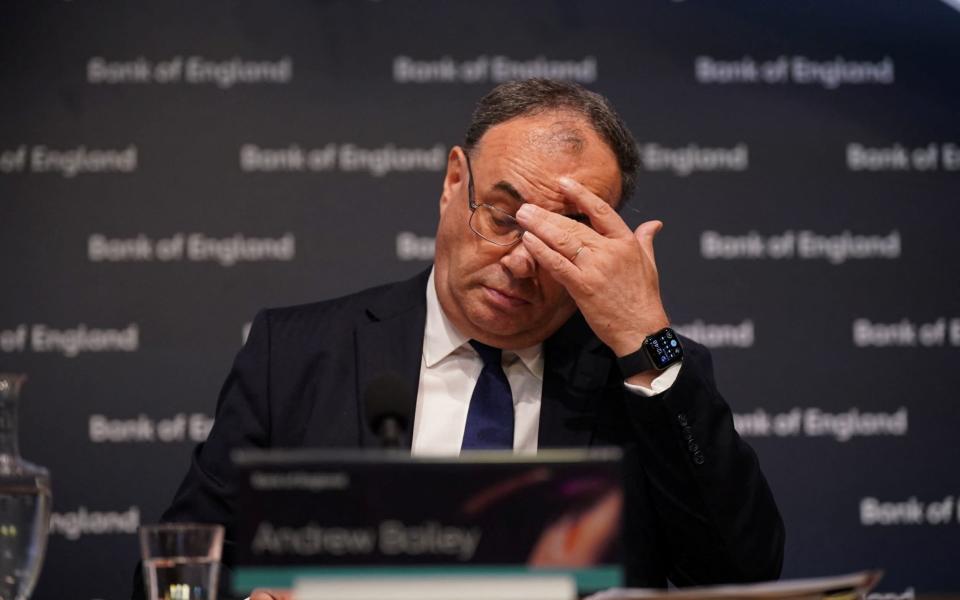
Andrew Bailey has warned Liz Truss not to challenge the Bank of England’s rule making powers and change its mandate, as tensions between Threadneedle Street and ministers continue to escalate.
My colleague Simon Foy reports:
In a letter to the Treasury committee, the Governor of the Bank of England said curbing the institution’s independence could damage its international reputation.
Mr Bailey also indicated his opposition to a proposal that would allow ministers to reverse any decisions made by City regulators if they are seen to be holding back post-Brexit reforms.
02:24 PM
US producer prices ease
US producer prices eased in July, in a further signed price pressures are cooling in the world’s biggest economy.
Our economics editor, Szu Ping Chan, has the details:
US factory gate prices eased back in July, in another sign that inflation in the world’s largest economy may have peaked.
Producer prices fell 0.5pc on the month, compared with an expected rise of 0.2pc. This took the annual rate to 9.8pc in July, far lower than the 11.3pc rise recorded in June.
Economists said the drop mostly reflected a drop in energy costs. It’s also another sign that prices in the shops will also start to moderate. S&P 500 futures were boosted by the news. US stocks are expected to open higher.
02:20 PM
McDonald’s to start reopening Ukraine restaurants

In a signal western businesses are seeking a return to Ukraine, McDonald’s said it would look to reopen some of its stores in the war-torn country over the next few months.
In a note to employees seen by Reuters, McDonald’s said:
After extensive consultation and discussion with Ukrainian officials, suppliers, and security specialists, and in consideration of our employees’ request to return to work, we have decided to institute a phased plan to reopen some restaurants in Kyiv and western Ukraine.
The fast food giant did not specify how many restaurants it planned to reopen, after closing all 109 of its outlets in March following Russia’s invasion.
McDonald’s recently revealed a $1.4bn hit from closing its 850 Russian restaurants amid a wider exodus of western firms from Putin’s country. The Kremlin promptly opened a copycat version of McDonald’s, called “Tasty, and that’s it”.
01:28 PM
OPEC expects oil market surplus in break with IEA
Oil-producer cartel OPEC said global oil markets will enter a surplus this year as it cut its demand forecast – putting it at odds with the IEA’s more bullish outlook.
Bloomberg reports:
The Organization of Petroleum Exporting Countries cut forecasts for the amount of crude it will need to pump in the third quarter by 1.24 million barrels a day to 28.27 million a day, according to its latest monthly report. That’s about 570,000 barrels a day less than OPEC’s 13 members pumped in July.
01:18 PM
Readout from energy talks: not much
The Treasury has published a readout the Prime Minister, chancellor and business secretary’s roundtable with the electricity sector this morning.
Boris Johnson turning up is unexpected, but other than that it feels like there’s not much new happening.
HMT says:
The Chancellor and energy firms agreed to work closely over the coming weeks to ensure that the public, including vulnerable customers, are supported as unprecedented global events drive higher energy costs.…
As set out in the Energy Security Strategy, the Government has launched a consultation to drive forward market reforms and ensure the market works better for consumers. Discussion focused on how Government and industry can collectively drive forward reforms to ensure the market delivers lower prices.
Per the outgoing PM:
We know that this will be a difficult winter for people across the UK, which is why we are doing everything we can to support them and must continue to do so.
Following our meeting today, we will keep urging the electricity sector to continue working on ways we can ease the cost of living pressures and to invest further and faster in British energy security.
“Everything we can” is carrying a lot of water there given the Government hasn’t announced new support in about three months.
Per the (also probably outgoing) chancellor, Nadhim Zahawi:
This morning I hosted industry leaders from the electricity sector to discuss what more they can do to work with Government and act in the interest of the country in the face of rising prices caused by Putin’s illegal invasion of Ukraine.
We have already acted to protect households with £400 off energy bills and direct payments of £1,200 for 8 million of the most vulnerable British families. In the spirit of national unity, they agreed to work with us to do more to help the people who most need it.
12:56 PM
Winter holiday blow for Wales as Wizz scraps flights

Winter sun holidays from Wales have been scuppered as Wizz Air cancels flights to beach destinations from Cardiff airport.
My colleague Helen Cahill reports:
The budget airline is cutting journeys to nine holiday spots blaming “economic pressures” as post-pandemic pressures continue to hamper the travel industry.
The airline has stopped selling tickets to Alicante, Corfu, Heraklion, Faro, Larnaca, Lanzarote, Palma de Mallorca, Sharm El-Sheikh and Tenerife from September 19.
Holidaymakers who have already bought their tickets will be able to rebook comparable flights to go next summer from Cardiff or travel from London Gatwick or Luton Airport this winter.
12:39 PM
GSK slumps 12pc in biggest fall since 1998 on heartburn drug fears
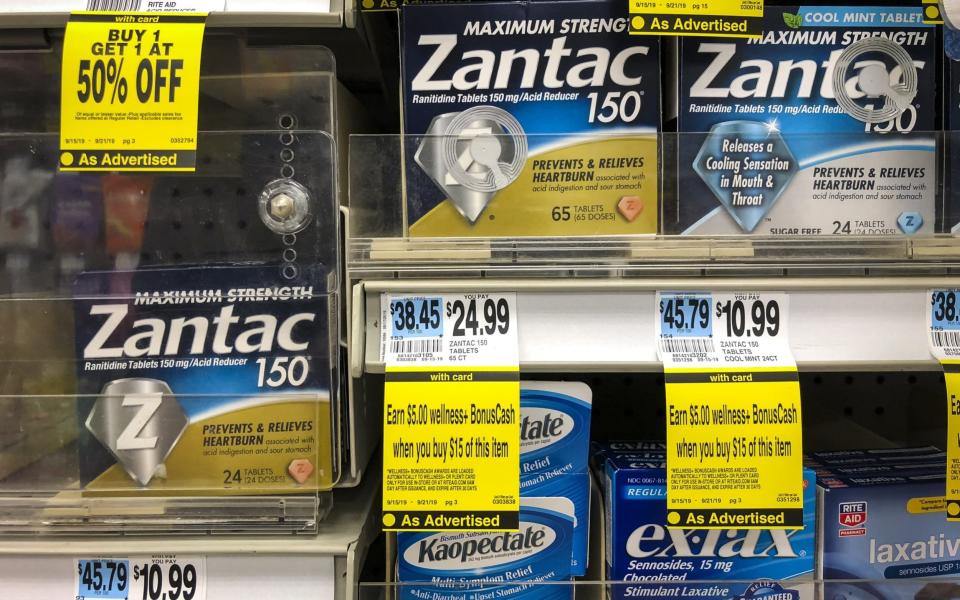
Ouch. Shares in GlaxoSmithKline have slumped 12pc – the biggest drop since 1998 – amid concerns about litigation over the heartburn drug Zantac.
The pharma giant and Haleon, its recently spun-out consumer goods wing, are both deep in the red.
Zantac, a once-popular antacid, is the centre of several US lawsuits that claim it causes cancers.
Sanofi, GSK and Boehringer Ingelheim, including several other generic drugmakers, are accused of failing to warn users about the product’s risks.
12:29 PM
Shipping boss says freight prices starting to ease
The boss of one of the world’s biggest shipping companies has said there are signs soaring freight rates may be easing off.
Rolf Habben Jansen, chief executive of Hapag-Lloyd, said:
We are currently seeing the first signs in some trade lanes that spot rates are easing in the market. The currently still strained situation in the global supply chains should improve after this year’s peak season
It came as his company reported a near-doubling in revenue to €17bn in the first half of the year.
12:04 PM
Scholz promises more relief for Germans

German chancellor Olaf Scholz has pledged his government with do more to provide relief in the face of soaring energy bills.
Speaking at a press conference, he said Germany “will do everything we can to ensure that citizens get safely through this period”.
The country faces rationing, with nearly half its homes reliant on gas for heating. Mr Scholz is under pressure to avert a winter crisis.
Earlier this week, finance minister Christian Lindner said the country would increase the base tax-free allowance and also bring up the level at which the country’s 42pc top income tax rate kicks in to help counter soaring inflation.
11:53 AM
Full report: Energy bills to top £5,000 next year

We have a full report up on warnings household energy bills will soar to more than £5,000 a year next April, according to a grim new forecast.
Here’s an extract:
Ofgem, the energy regulator, may have to set the price cap at £5,038 per year for the average home amid elevated gas prices, energy consultancy Auxilione said.
Experts said the cap could hit £4,467 in January, which is likely to be a more worrying figure for families as they use the most energy in winter. Such a scenario would leave the average household paying £571 for energy in January.
They warned the cap is likely to remain above £4,000 throughout next year.
Ministers are holding crisis talks with utility bosses today to discuss how support for households can be improved.
11:20 AM
UK power prices to remain above pre-2021 average for next decade, analysts warn
UK power prices are predicted to remain above the the pre-2021 average for the next decade despite a downwards push from renewables, analysts have said.
Cornwall Insight say prices will fall below £100 per megawatt hour from 2026 onwards.
It is an improvement from an earlier forecast that saw prices staying above the £100 mark through the decade.
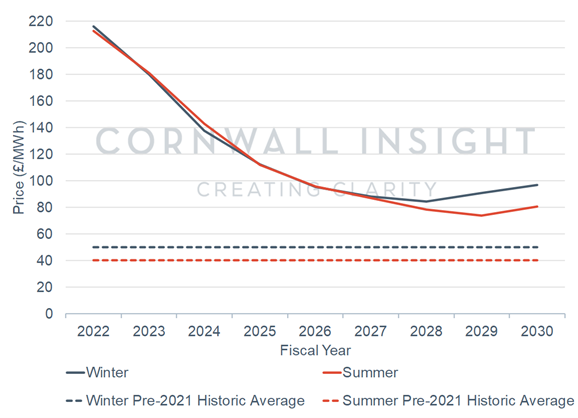
Tom Edwards, a senior modeller at the consultancy, said:
Our data shows the benefits to the market of a growth in renewable investment, with the increasing competition for GB renewables reducing prices and helping stabilise the energy market over the next few years…
While this is positive news, we need to recognise that prices are forecast to remain above pre-2021 average until 2030. It is important that the UK and others maintain the course on low carbon generation, which alongside other measures to increase energy security such as additional nuclear or diverse gas imports, will be one of the key players in this journey.
11:06 AM
Rhine levels set for further plunge

Water levels in the Rhine, Germany’s crucial waterway, are set to drop even lower than previously forecast in the coming days.
Water levels at Kaub, a key chokepoint on the river, will drop to 33 centimetres by the 15th, according to the German Federal Waterways and Shipping Administration.
Below 40cm, that section of the river becomes effectively impassable for barges.
10:47 AM
Money round-up
Here are some of the day’s top stories from the Telegraph Money team:
10:24 AM
Ministers set for talks with energy bosses

As mentioned earlier, today’s scary price cap forecasts coincide with a crunch meeting between ministers and energy sector bosses about how households can be supported.
PA reports:
Chancellor Nadhim Zahawi and Business Secretary Kwasi Kwarteng will press gas and electricity company executives for solutions to the predicted spike in bills over winter.…
Executives are being asked to submit a breakdown of expected profits and payouts, as well as investment plans for the next three years.
Ben Marlow, our chief city commentator, is not impressed. He writes:
What is this meant to achieve? Unless another windfall tax is planned to pay for more assistance on energy bills – putting aside the short-sightedness of such taxes – it risks being the usual performative gesture politics.
10:05 AM
Russian oil output to drop by a fifth next year as import ban kicks in, says IEA

Russian oil output will drop by a fifth next year as the European Union’s import ban kicks in, the International Energy Agency has said.
Bloomberg reports:
Gradual monthly declines will start as soon as this month as Russia cuts back refining, and will quicken as the embargo takes effect, the IEA said in a market report. The agency expects to see close to 2 million barrels a day shut in by the start of 2023, despite a healthy recovery in production in recent months.
The EU is set to halt most crude purchases from Russia from Dec. 5 in a bid to cut off revenue streams that the Kremlin uses to finance its war in Ukraine. From Feb. 5, an EU ban on Russian oil-product shipments takes effect…
Russia’s oil output has risen in the past three months, reaching almost 10.8 million barrels a day in July amid higher domestic crude-processing and robust exports as the country redirects crude flows to Asia.
09:48 AM
Latest ONS data points to activity slowdown
The Office for National Statistics’ latest round of faster indicators are pretty mixed, with a 5pc fall in seated diners among the most notable shifts.
The volume of online job adverts was broadly unchanged on the previous week, bu t5pc lower than the same time a year ago.
Interestingly:
Approximately 5pc of businesses with 250 or more employees offered a one-off cost of living payment to their employees in the last three months; this compares with 1pc of businesses with fewer than 250 employees offering a payment.
You can examine the stats further here:
09:31 AM
Heathrow boss: Flight cap has cut delays
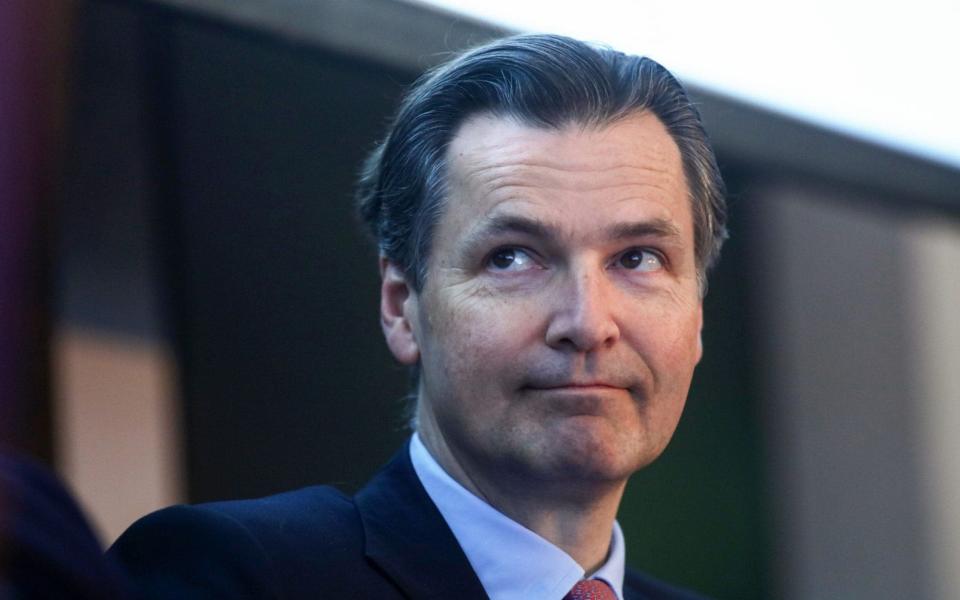
Heathrow boss John Holland-Kaye has defended the airport’s controversial flight cap, saying it has reduced delays.
The top airport’s 100,000 daily departing passenger limit has resulted in improved performance, he said, adding:
Passengers are seeing better, more reliable journeys since the introduction of the demand cap.
The airport said 88pc of its passengers are now clearing security with 20 minute, after it brought in 1,300 new security staff following severe hold-ups.
09:23 AM
Drax drops after Kwarteng says burning wooden pellet not sustainable
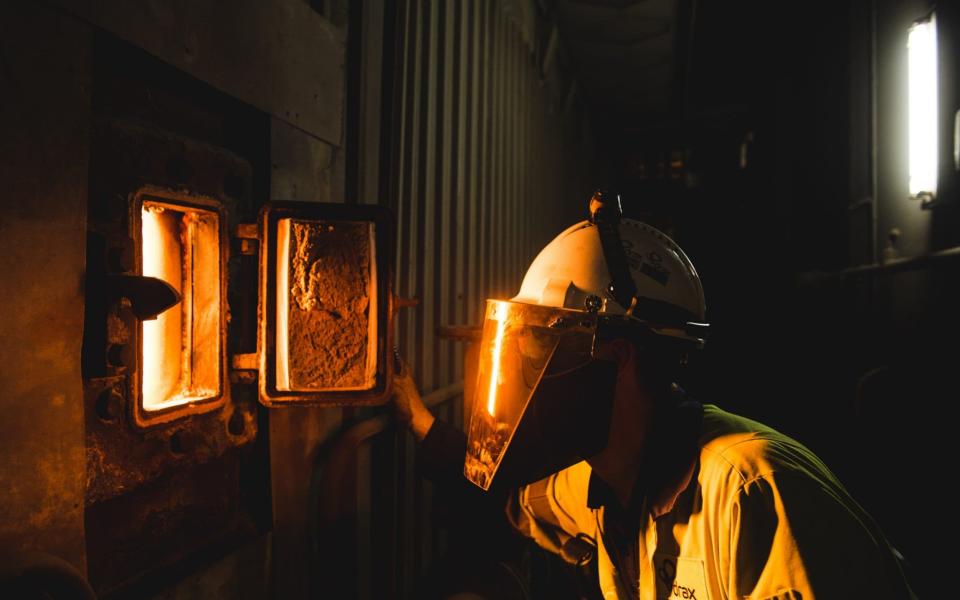
Power company Drax has fallen as much as 11pc today after Kwasi Kwarteng, the business secretary, said the company’s process of importing wood pellets from the US to burn is not sustainable.
Mr Kwarteng said the process “doesn’t make any sense”, the Financial Times reports.
Kwasi Kwarteng also told MPs that the government had not fully investigated the sustainability of burning wood pellets, a type of biomass. He said the Department for Business, Energy and Industrial Strategy had discussed biomass with industry but “we haven’t actually questioned some of the premises” of the sustainability of pellets.
08:50 AM
US petrol drops below $4 a gallon in boost for Biden
US petrol prices have fallen below $4 a gallon for the first time since March, as inflationary pressures continue to ease in the world’s biggest economy.
The fall — a boost for President Joe Biden, who has made lowering pump prices a priority — follows a softer-than-expected inflation reading yesterday.
08:29 AM
FTSE 100 flat
I appear to have overpromised on the FTSE – despite futures indicating a gain of about 0.1pc in the run-up to the open, Britain’s blue-chip index rose as much as… 0.08pc. It’s now down 0.06pc.
Not looking like a day to write home about (or text the family WhatsApp group about) for London.
08:24 AM
Those gas prices…
Here’s a reminded of how Europe’s benchmark gas prices have shifted in recent month (these are Dutch 1-month future, in euros/MWh):

Auxilione says:
The recent heatwave across Europe has reduced water levels meaning the nuclear power generation is under threat due to a lack of cooling water. In Norway, a similar story with water levels meaning less hydro generation possible. If we look towards coal and lignite, that often requires delivery by ships which are unable to travel in low water levels making that extremely difficult.
The market’s reaction is based on facing into a series of options that are quickly being exhausted for Europe as it seeks to find alternatives to Russian gas.
08:19 AM
New forecast predicts energy price cap will top £5,000 next April
A new grim milestone in energy forecasts: consultancy Auxilione says they expect Ofgem’s energy price cap to top £5,000 next spring.
The consultancy predicted the regulator will push the cap to £5,038 next April, based on continued elevation in gas prices and a sharp upwards move yesterday.
Its analysts said:
Today the UK government has called in energy companies to try and find a way to work together to bring down prices. It seems there is little appreciation for just how impossible that task really is and that energy companies and the government have little control over this in such a globally influenced market.
07:58 AM
Economist: ‘Matter of time’ before house prices fall
Despite the still-upbeat assessment of surveyors, Capital Economics’s Andrew Wishart reckons it’s “just a matter of time” before house prices follow activity lower.
Commenting on the RICs survey, he said:
While we suspect supply will remain tight, we don’t think that will be enough to prevent a drop in prices. With the new buyer enquiries balance still lower than the sales instructions balance, the survey remains consistent with prices falling by the end of the year.
Here’s that relationship, charted:

Mr Wishart added:
Other commentators are arguing that tight supply will support prices. But the historical record shows that increases in interest rates of the scale we are seeing now is always a precursor of house price falls.
07:44 AM
Era of €10 flights is over, says Ryanair boss

The age of the €10 plane ticket is over amid soaring fuel costs, the chief executive of Ryanair has warned.
Michael O’Leary said the budget airline’s average fare would rise over the coming years, from €40 to around €50 in the next half decade.
He told the BBC’s Today programme:
There’s no doubt that at the lower end of the marketplace, our really cheap promotional fares – the one euro fares, the €0.99 fares, even the €9.99 fares – I think you will not see those fares for the next number of years…
We think people will continue to fly frequently. But I think people are going to become much more price sensitive and therefore my view of life is that people will trade down in their many millions.
07:34 AM
Truss-backing economist: let banks lend to get renters on housing ladder

RICS’ report comes as a separate paper called on policymakers to shake-up mortgage rules and remove red tape preventing millions of renters from getting on the housing ladder.
Gerard Lyons, former economic adviser to prime minister Boris Johnson, urged the government to move away from taxpayer-funded schemes and give banks the power to lend more money to people they think are less risky.
The influential economist, who is backing Liz Truss to become the next prime minister, also said renters should be allowed to use their payment history to boost their chances of getting a mortgage.
Longer fixed-rate deals and bigger mortgages for safer borrowers would also get more people on the ladder, he said. Mr Lyons claimed up to three million people could benefit from the changes.
07:24 AM
Supply remains crucial despite rate worries
Even as rising mortgage rates, falling real wages and recession fears drag on the demand side of the housing market, it’s supply – or a severe lack thereof – that underpins surveyors’ bullish view on prices. Per RICS:
Prices continue to rise across all parts of the UK, even if the rate of growth has softened in many cases compared with earlier in the year. Limited supply available is still seen as a crucial factor underpinning the market.
Rental demand also remained strong, according to RICS, with a net balance of 36pc of property professionals reporting an increase. However, with more landlords taking their properties off the market, rents are also expected to rise in the near-term.
07:16 AM
Agenda: House prices rise despite interest rates pushing up costs for buyers
Good morning. Rapidly-rising interest rates won’t take the heat out of the UK’s housing market, a new report says.
The Royal Institution of Chartered Surveyors (RICS) says a lack of properties coming onto the market will offset waning interest from buyers in the coming year.
A lack of properties for sale is expected boost prices, even as buyer interest wanes, according to the Royal Institution of Chartered Surveyors (RICS).
While sales continued to decline in July compared with the previous month, RICS said a net balance of 63pc of surveyors reported an increase in house prices rather than a decline.
This “firmly upward trend” was reported across the UK, and is expected to continue over the next 12 months, RICS said.
Meanwhile, the FTSE 100 is set for a mild rally as relief from yesterday’s cooler-than-expected US inflation figures buoys markets.
5 things to start your day
1) How stealth taxes became Gordon Brown’s grimmest legacy Frozen thresholds amid soaring inflation mean one worker in every nine pays the higher rate of income tax
2) Britain faces threat of rolling blackouts as electricity rationing becomes ‘load shedding’ As supplies falter, the UK could see the first managed decline of its energy system for decades
3) Top banker quits after telling female colleague he needed ‘love and affection’ Citigroup dealmaker Jan Skarbek was suspended after allegedly making the comments on a staff getaway
4) Russia starts stripping aircraft for parts as sanctions bite Aeroflot forced to cannibalise planes to keep flying
5) Disney plans ad-funded version of streaming service in battle with Netflix Marvel and Star Wars owner defies slowdown fears with big jump in subscribers
What happened overnight
Hong Kong stocks opened with small gains on Thursday, with the Hang Seng Index climbing 1.17 per cent, or 229.73 points, to 19,840.57.
The Shanghai Composite Index added 0.42 per cent, or 13.45 points, to 3,243.47, while the Shenzhen Composite Index on China’s second exchange rose 0.47 per cent, or 10.18 points, to 2,191.01.
Coming up today
-
Corporate: Antofagasta, Coca-Cola HBC, Derwent London, Entertain, M&G, Network International Holdings, OSB Group, Petrofac, Prudential, Savills, Spirax-Sarco Engineering (interims)
-
Economics: Jobless claims (US), producer price index (US)










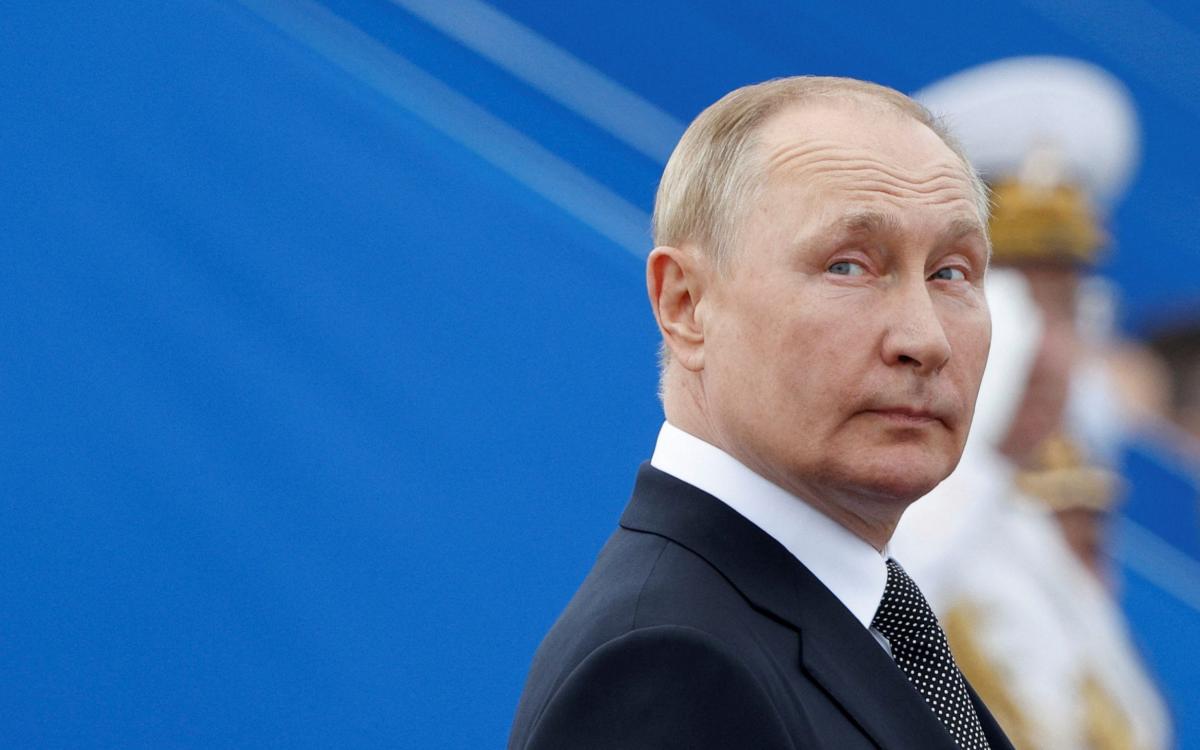





.jpg?itok=F2C4uk0x)




Discussion about this post